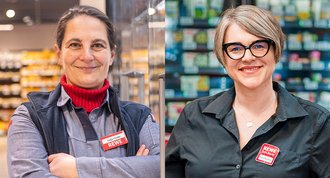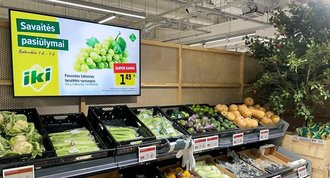
REWE plans to discontinue the print flyer in summer 2023. one spoke to Divisional Director Peter Maly about the effect on the environment, climate and resources, modern ways of communicating with customers and feedback from retailers.
 one: REWE is the first grocery retailer in Germany to venture out of leaflet advertising. This is despite the fact that a large number of German consumers still use leaflets to prepare for their purchases. Why is REWE doing this?
one: REWE is the first grocery retailer in Germany to venture out of leaflet advertising. This is despite the fact that a large number of German consumers still use leaflets to prepare for their purchases. Why is REWE doing this?
Peter Maly: REWE Group has been consistently committed to Sustainability in its corporate strategy for years and is gradually and successfully transforming its processes and offerings with this in mind. Above all by means of digitalisation - where there is added value for customers. As part of tests in various REWE regions, we have successfully trialled the use of increased price communication via digital channels instead of printed flyers in stores in recent months. In this respect, we are ready to discontinue the printed flyer for all REWE stores in summer 2023 and thus also make a significant contribution to protecting the environment, climate and energy by reducing resources.
one: What are the environmental benefits of discontinuing the flyer?
Peter Maly: The effect on the environment, climate and resource conservation is immense: REWE currently distributes around 25 million flyers every week. More than 73,000 tonnes of paper were produced and printed for this in 2021. Paper production and printing are particularly energy-intensive and are responsible for 90% of the carbon footprint of flyers. In this respect, the best advertisement for the acceptance of the decision is the benefit for the environment.
The savings potential resulting from the switch to digital flyer communication is illustrated by the following comparisons per year: by discontinuing the flyer, we are leaving around 390,000 m³ of wood in the environment, which corresponds to the amount of wood used in 356 REWE Green Farming stores. The changeover also saves 1.1 million m³ of water and a good 70,000 tonnes of CO2, which corresponds to the annual CO2 emissions of more than 60,000 cars with combustion engines. In terms of energy, we save around 380 million kWh per year, which corresponds to the annual electricity consumption of 100,000 four-person households.
one: What will happen before the switchover in summer 2023?
Peter Maly: Until the changeover in summer 2023, we will continue to produce and distribute the flyer in the usual form for customers and store displays. Due to the tight paper situation and in order to become more sustainable today, the printed flyer will be reduced in circulation and number of pages this year and converted to a smaller format. As a first step, REWE will reduce the print run of paper flyers by around four million copies from the beginning of August 2022.
one: The decision was preceded by a one-year regional test phase. What did the test show?
Peter Maly: The printed paper flyer has a long tradition in the retail marketing mix. Nevertheless, in addition to the Sustainability aspects, we also want to ensure that we reach customers of all age groups in future. In this respect, tests in our stores were unavoidable. This was the only way we could directly measure and analyse the reaction of our customers. During the test phases, we offered various channels for communicating our offers. We temporarily increased and reduced the use of some channels - both traditional and digital. Of course, there were queries from customers in the stores who missed the flyer. Overall, this was manageable and enquiries were consistently answered and explained in the test stores. Of course, the more than 200 REWE special offers will continue to be available every week in the future, only no longer in print, but in an environmentally friendly way on digital channels such as the REWE app, as well as numerous coupons and benefits. This has also convinced the critical customers.
one: According to estimates by the Cologne-based market research institute IFH, the proportion of weekly brochure readers in the food retail sector is around 50 per cent. How will REWE reach customers with offers in future?
Peter Maly: We are moving with the times and will reach the entire customer base in future, even without printed flyers. With increasing digitalisation, the media channels and therefore the possibilities for placing advertising efficiently and using fewer resources have increased. At the same time, media consumption has changed and with it the ways in which purchasing decisions are made.
Against this background, there are also opportunities for REWE to reduce resource consumption and greenhouse gas emissions in customer communication in line with its own sustainability and climate targets, and even to increase the visibility of its offers through more frequent and comprehensive communication. Essentially, the leaflet content is being digitised. The principle, scope, product selection and price attractiveness of the weekly offers will remain unchanged. The digital version of the flyer - at rewe.de/angebote and in the REWE app - will also remain the same. In addition, REWE will increasingly advertise the more than 200 promotional items per week in traditional media and support the changeover with an intensive and longer-term marketing and Sustainability campaign under the motto #umdenkbar. Promotional price labels on the shelves in REWE supermarkets will also continue to provide clearly visible information about which items are reduced in price that week.
one: What was the feedback from shoppers?
Peter Maly: Of course, we communicated with our retailers right from the start. The retailers and our store managers are the yardstick for us as to whether we implement such far-reaching decisions in practice or not. The feedback was extremely positive. Many retailers who were already involved during the test phase, for example, believe that phasing out the flyer is the right step at the right time and see it as a realignment of the promotional business and a big step towards massively reducing our carbon footprint.
For the environment, climate and energy savings
 REWE is the first food retailer in Germany to decide in favour of phasing out printed flyers.
REWE is the first food retailer in Germany to decide in favour of phasing out printed flyers.
This is why REWE is doing away with printed flyers.

Stefan Lamke: "When it became clear that my stores would be part of the test area, I was immediately hooked. I've always taken a critical view of the flyer for two reasons: Sustainability and profitability. I have always asked myself the question: Who still reads the flyer today? Is the size up to date? Do we even need so many promotional articles?
Of course, the reach and wastage of flyer advertising cannot really be measured. But: after distribution was discontinued in Dresden in late summer last year, only a few, mostly older customers complained. It is important to take these people with us and show them the alternatives. We explained the REWE app to smartphone users and set it up. We invited the others as charmingly as possible to visit the store to get an overview of the current, clearly visible promotional prices. It is precisely this personalised approach that sets us apart from discount stores.
To summarise, I can say that it is exactly the right step at exactly the right time and, for me, a clear competitive advantage. We have laid the foundation for the reorganisation of our promotional business."
About the person
Stefan Lamke manages two REWE stores 500 metres apart in Dresden's old town. The 29-year-old is Co-TEK Sustainability in the eastern region.

"I was really worried when we got rid of the flyer. And my customers weren't thrilled at first either. Some of them said quite directly: 'If we don't know what you have on offer, we won't come back. I know from home how important the flyer is. My wife also looks at the offers every week.
That's why I thought my revenue would collapse completely. But we did a lot of convincing. Our customers here in the countryside have an average age of 55. Some of them don't have a smartphone yet. We gave them special support in the store and drew their attention to the adverts and offers on site. We showed the customers who do have a smartphone how they can access the flyer digitally via the app.
It then took just under three months for everything to settle down. The customers stayed and so did the revenue. Due to the huge increase in revenue during the coronavirus period, the figures are not quite comparable, but the bottom line is that we are making savings and turnover has remained almost the same. In hindsight, I have to say that it was definitely the right decision to do without the flyer. And if customers can reliably subscribe to the flyer via WhatsApp in future, then we're on the right track."
About the person
Marco Martin has been a REWE salesman with a store in Heusweiler in Saarland for three years.

Güntner René: The fact that we left out the print version of the flyer in a REWE City for the test did not leave any traces. On the contrary: before, there was often confusion because in my area there are two REWE City stores and one REWE Centre in addition to the classic REWE store. Accordingly, there are also different printed leaflets. This has sometimes led to confusion among customers.
In addition, we mainly have walk-in customers in the REWE City store, who usually look for special offers in the store first and rarely look at the flyer in advance.
For everyone else, we used wobblers in the places where the print flyers used to be displayed to draw attention to the alternatives. Customers then scanned the QR code and downloaded the app. Most customers are used to the fact that such information is now mostly distributed digitally. However, there were only very few requests for the printed leaflet anyway. And there was also no noticeable effect on sales that we were no longer distributing it. My conclusion: In my test store, the changeover away from the print leaflet was very quiet and we don't want it back.
About the person
René Güntner is the Management Director Retailers in the South West region. A REWE City in the Leinfelden-Echterdingen area was one of the test stores that did away with the flyer last year.












Both German and English comments appear here.
it's a pity, all those who are not so 'up to date' with digitalisation are not seen - a benefit for the environment - YES, this is true, but unfortunately all those people in our society are forgotten who do not or rather cannot use this opportunity (no matter what the reason might be). this is exactly what you should consider, especially with current price increases, the flyers are again so 'up to date' - you don't believe that! please don't play the ENVIRONMENT off against the diversity of our society.
It's a shame that the REWE retailers aren't given a chance to have their say here, as they would be very honoured to keep the brochures for the benefit of customers. It's good if you can use one-sided reports to your advantage, then we'll just go to Edeka ;-)
Unfortunately, our REWE store in Erlensee knew nothing about the test last year, neither REWE Reising nor the store in Leipziger Straße. Instead, cards were displayed with the message "No flyer - call here". Unfortunately, it took several calls to the REWE hotline to find out that you live in a test area. By e-mail, we were only told that nothing was being distributed in our street. the flyers were posted 50 metres away and the Deutsche Post distribution service was not informed either. We were told that Rewe had not delivered enough flyers. A nice postman then threw in the flyer for us. It is important that you inform your staff and all affiliated businesses about such things.
It's a shame, unfortunately senior citizens are being excluded more and more. My father (almost 81) and my mother (almost 78) always look forward to the offer sheets. They use them to put together their shopping list. They don't have a smartphone or anything else. Which young people look at offers, neither digitally nor on paper? Senior citizens fall behind, same issue with the closure of bank branches. My parents don't have online banking.
sorry, Penny is sometimes not really cheaper than Rewe
Hello Simply FIRST TO PENNY